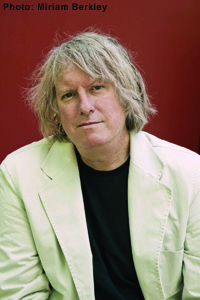Back Where We Come From
Steve Yarbrough explores the mystery of memory and the complexity of the past
According to Luke May, the narrator of Steve Yarbrough’s superb new novel, Safe from the Neighbors, “you can find some of the worst people in the world in Mississippi, but also some of the best, and the quickest way to tell them apart is to look where they stand on race.” But when a ghost from Luke’s past unexpectedly resurfaces, prompting an investigation of events both personal and notoriously historic, Luke learns that the past is never quite so simple, and that some truths are too powerful to make easy sense of.
A high-school history teacher in fictional Loring, Mississippi, Luke May is both inspired and tormented by his proximity to the tumultuous events of the civil-rights era. The weight of his home state’s fraught history persistently bears down on Luke, who lectures his students about the importance of causality, context, and “a healthy respect for hindsight.” In Luke May’s experience, “there are plenty of white guys like me in Mississippi who don’t know what their fathers did during the civil rights era, because they don’t want to know.” Luke, however, knows that his father, then a struggling tenant farmer perpetually at the brink of ruin, once belonged to a Klan-like organization called the Citizens’ Council. “Having a father from the Greatest Generation is one thing,” Luke laments. “Knowing he was a member of the Citizens’ Council is quite another.”
 Luke knows something else about his father, as well. On the eve of James Meredith’s enrollment, under the protection of federal marshals, as the first African American student at the University of Mississippi, Luke and his father watched on live television as President Kennedy cautioned Mississippians that the eyes of the nation were upon them. Nevertheless, Luke’s father left the house with a Colt revolver tucked into his belt and rode off to Oxford with his best friend, Arlan Calloway, to join what has come to be known as the 1962 Ole Miss Riot. The next morning, the people of Loring learned that, sometime during the night, two men were shot to death in Oxford, and also that, closer to home, Arlan Calloway had killed his wife Nadine, allegedly in self defense. Not long after, Arlan left Loring with his two children, never to be seen or heard from again.
Luke knows something else about his father, as well. On the eve of James Meredith’s enrollment, under the protection of federal marshals, as the first African American student at the University of Mississippi, Luke and his father watched on live television as President Kennedy cautioned Mississippians that the eyes of the nation were upon them. Nevertheless, Luke’s father left the house with a Colt revolver tucked into his belt and rode off to Oxford with his best friend, Arlan Calloway, to join what has come to be known as the 1962 Ole Miss Riot. The next morning, the people of Loring learned that, sometime during the night, two men were shot to death in Oxford, and also that, closer to home, Arlan Calloway had killed his wife Nadine, allegedly in self defense. Not long after, Arlan left Loring with his two children, never to be seen or heard from again.
Forty-four years later, Luke and his wife Jennifer are new empty nesters becoming acutely aware of the space that has cropped up between them. Their sex life long dormant, the Mays barely acknowledge one another when not bickering over money or getting drunk with Luke’s elderly mentor, Ellis Buchanan, a raffish charmer who once owned the local newspaper. In Loring, Ellis was among the first to condemn Jim Crow and segregation, making him a veritable saint in Luke’s eyes—especially when compared to his own father, whom Luke has perhaps prematurely condemned for being among the ranks of Mississippians who stood on the wrong side of the defining issue of race.
Abruptly and fortuitously, Arlan and Nadine Calloway’s daughter resurfaces in Loring and joins the French department at Luke’s school. Luke doesn’t initially recognize Maggie Sorrentino, an urbane, obviously well-to-do widow almost as out of place on the Loring High faculty as her gleaming new Mercedes is in the teachers’ parking lot. But when she recalls herself to Luke, he finds himself both helplessly attracted to her and suddenly obsessed with the coincidence of her mother’s killing and the Ole Miss Riot. In short order, Luke embarks upon a dubious investigation of the circumstances around Nadine Calloway’s death and trips headlong into a risky affair with Maggie. Encouraged by her cryptic recollections of that fateful night, Luke begins to suspect the involvement of his father, the last person to see Arlan Calloway before he drove home and blew his wife away with a shotgun.
 In his measured examination of Luke’s conflicted attitude towards his father, Steve Yarbrough masterfully illustrates how categorical judgments like Luke’s moral division of good and bad Mississippians are somehow both essential and inadequate. James May, who once drove to Oxford with a loaded gun to keep a fellow war veteran from going to college because he was black, turns out to be a man whose deeds and motives require an understanding of humanity too nuanced and ambiguous to fit comfortably into his disapproving son’s worldview. James May’s determination to nurse his invalid wife through the pain and humiliation of physical decline contrasts starkly with Luke’s careless betrayal of his own family. Ironically, the very history that underpins Luke’s rigid morality transforms him utterly as he peels back its numerous layers. In the end, Luke learns that his father is in some ways exactly who he thought he was, which, it turns out, was always much more than Luke could see.
In his measured examination of Luke’s conflicted attitude towards his father, Steve Yarbrough masterfully illustrates how categorical judgments like Luke’s moral division of good and bad Mississippians are somehow both essential and inadequate. James May, who once drove to Oxford with a loaded gun to keep a fellow war veteran from going to college because he was black, turns out to be a man whose deeds and motives require an understanding of humanity too nuanced and ambiguous to fit comfortably into his disapproving son’s worldview. James May’s determination to nurse his invalid wife through the pain and humiliation of physical decline contrasts starkly with Luke’s careless betrayal of his own family. Ironically, the very history that underpins Luke’s rigid morality transforms him utterly as he peels back its numerous layers. In the end, Luke learns that his father is in some ways exactly who he thought he was, which, it turns out, was always much more than Luke could see.
Given the centrality of the civil-rights movement to its past and present action, Safe from the Neighbors suffers slightly from a surprising dearth of African American voices. This hole in the narrative is not really a flaw so much as a sobering reminder of the persistence of racial division in the contemporary South and the nation at large. Even a liberal teacher in a public high school that is 70 percent African American finds that, despite his just instincts and sincere sense of fairness, the world he occupies is mostly white.
While the dark side the of civil rights era hangs heavily over Safe from the Neighbors, Steve Yarbrough’s aim is not so much to reopen old wounds as to uncover the subtle, quiet ways in which contemporary prejudices and perspectives continue to be shaped by both public and private history. In doing so, he has crafted a novel that is as full of wisdom and insight as it is engrossing. Yarbrough ably blends a quietly incisive style with the kind of riveting, compulsively readable storytelling one expects to find in less profound and elegant fare. Safe from the Neighbors succeeds mightily in demonstrating how, especially in the Deep South, the ghosts of the past are ever present, and the history they call to mind always more complex than most of us would like to admit.
Steve Yarbrough will give a free public reading at the Sewanee Writers’ Conference on July 21 at 8:15 p.m.


